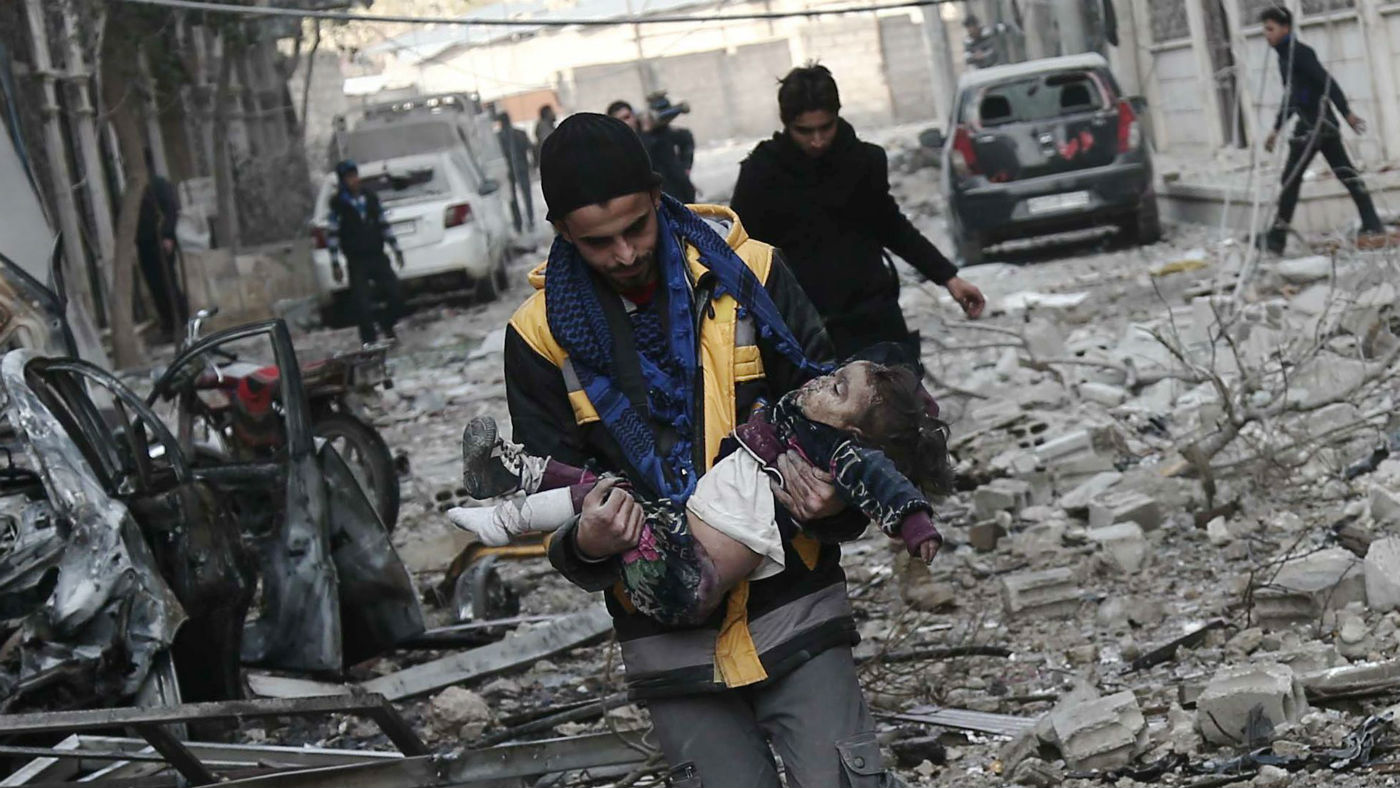Civilian deaths from air strikes doubled last year
MPs raise questions about how enemy combatants are identified - despite claims the RAF killed no civilians

A free daily email with the biggest news stories of the day – and the best features from TheWeek.com
You are now subscribed
Your newsletter sign-up was successful
The number of civilians killed in air strikes has almost doubled over the past year, raising fresh questions about British military practices in combat zones.
A global survey by Action on Armed Violence found more than 15,000 civilians were killed by explosive weapons in 2017, a rise of 42% on the previous year. The increase was driven by a surge in air-strike fatalities and coincided with the US-led military operations to reclaim Islamic State strongholds in Iraq and Syria.
One MP told The Guardian the figures were “deeply concerning” and raised questions over the transparency of legal criteria used by the Ministry of Defence to determine whether an individual is an IS combatant.
The Week
Escape your echo chamber. Get the facts behind the news, plus analysis from multiple perspectives.

Sign up for The Week's Free Newsletters
From our morning news briefing to a weekly Good News Newsletter, get the best of The Week delivered directly to your inbox.
From our morning news briefing to a weekly Good News Newsletter, get the best of The Week delivered directly to your inbox.
The chair of the all-party parliamentary group on drones, Clive Lewis, said: “Effectively distinguishing between those who are ‘directly participating in hostilities’ and those who are not is a prerequisite for distinguishing between legitimate and civilian targets.”
Iain Overton, executive director of Action on Armed Violence, said the figures, which are corroborated by other monitoring groups and a recent report by the Associated Press, raised “fundamental questions about the Royal Air Force’s claims that there is no evidence civilians are killed in its operations”.
The US military has admitted that 801 civilians in Syria and Iraq were unintentionally killed by air strikes last year.
Over the weekend, the White Helmets volunteer rescue group claimed at least 17 civilians were killed by government air strikes backed by Russian air power. CNN says at least ten medical facilities, including a women and children’s hospital, have been hit by air strikes and artillery shelling over nine days in the eastern provinces of Idlib and Hama.
A free daily email with the biggest news stories of the day – and the best features from TheWeek.com
Overton attributed the dramatic rise in civilian causalities in the Middle East to the changing nature of warfare in the region, as it moves out of rural areas and into the cities.
“There seems to be no interest from the coalition or the Iraqi government in properly understanding the level of civilian deaths. We’re becoming too complacent about urban warfare, and militaries and governments are downplaying the effects,” he said.
Asked by The Guardian to reveal how enemy combatants are indentified, a spokesman for the MoD said it does not comment on rules of engagement, but insisted it “had not seen any evidence that we have caused civilian casualties”.
“We do everything we can to minimise the risk to civilian life from UK strikes through our rigorous targeting processes and the professionalism of the RAF crews,” he said. “Reports of civilian casualties are and will continue to be taken very seriously and we will investigate all credible claims.”
-
 Crisis in Cuba: a ‘golden opportunity’ for Washington?
Crisis in Cuba: a ‘golden opportunity’ for Washington?Talking Point The Trump administration is applying the pressure, and with Latin America swinging to the right, Havana is becoming more ‘politically isolated’
-
 5 thoroughly redacted cartoons about Pam Bondi protecting predators
5 thoroughly redacted cartoons about Pam Bondi protecting predatorsCartoons Artists take on the real victim, types of protection, and more
-
 Palestine Action and the trouble with defining terrorism
Palestine Action and the trouble with defining terrorismIn the Spotlight The issues with proscribing the group ‘became apparent as soon as the police began putting it into practice’
-
 Epstein files topple law CEO, roil UK government
Epstein files topple law CEO, roil UK governmentSpeed Read Peter Mandelson, Britain’s former ambassador to the US, is caught up in the scandal
-
 Iran and US prepare to meet after skirmishes
Iran and US prepare to meet after skirmishesSpeed Read The incident comes amid heightened tensions in the Middle East
-
 Syria’s Kurds: abandoned by their US ally
Syria’s Kurds: abandoned by their US allyTalking Point Ahmed al-Sharaa’s lightning offensive against Syrian Kurdistan belies his promise to respect the country’s ethnic minorities
-
 Israel retrieves final hostage’s body from Gaza
Israel retrieves final hostage’s body from GazaSpeed Read The 24-year-old police officer was killed during the initial Hamas attack
-
 China’s Xi targets top general in growing purge
China’s Xi targets top general in growing purgeSpeed Read Zhang Youxia is being investigated over ‘grave violations’ of the law
-
 Syria’s Islamic State problem
Syria’s Islamic State problemIn The Spotlight Fragile security in prison camps leads to escape of IS fighters
-
 Panama and Canada are negotiating over a crucial copper mine
Panama and Canada are negotiating over a crucial copper mineIn the Spotlight Panama is set to make a final decision on the mine this summer
-
 Why Greenland’s natural resources are nearly impossible to mine
Why Greenland’s natural resources are nearly impossible to mineThe Explainer The country’s natural landscape makes the task extremely difficult